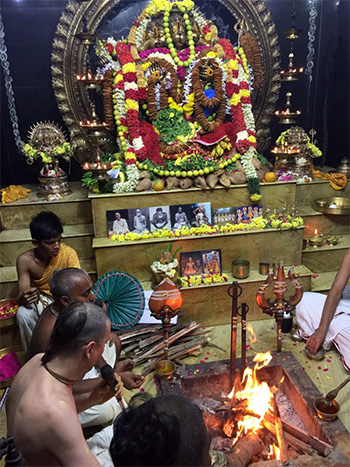Question: I am interested in information on Indian religious practices as related to dietary preferences.
This subject is quite vaste, and the answers would depend on the time period we analyse. For example, the present culture and religious practices in India are quite different from the ancient practices followed. There is a general decline and degradation of culture in India over the last 100 years, mostly due to the influence of western culture.
As far as diet is concerned, the ancient scriptures of India prescribe what one should or shouldn’t eat. Up until 100 years ago these were followed quite strictly in India. At present very few people continue to follow these principles.
In the Bhagavad Gita, Lord Krishna gives a basic description of food and dietary preference by first classifying all food into three categories, namely goodness (sattva), passion (rajas) and ignorance (tamas). It is the Vedic belief that everything (whether it be food, work, sacrifice, charity, or any activity) can be classified within these three categories of material existence. Goodness leads one to knowledge, passion to suffering, and ignorance to darkness.
ayuh-sattva-balarogya-
sukha-priti-vivardhanah
rasyah snigdhah sthira hrdya
aharah sattvika-priyah
“Foods dear to those in the mode of goodness increase the duration of life, purify one’s existence and give strength, health, happiness and satisfaction. Such foods are juicy, fatty, wholesome, and pleasing to the heart.”
katv-amla-lavanaty-usna-
tiksna-ruksa-vidahinah
ahara rajasasyesta
duhkha-sokamaya-pradah
“Foods that are too bitter, too sour, salty, hot, pungent, dry and burning are dear to those in the mode of passion. Such foods cause distress, misery and disease.”
yata-yamam gata-rasam
puti paryusitam ca yat
ucchistam api camedhyam
bhojanam tamasa-priyam
“Food prepared more than three hours before being eaten, food that is tasteless, decomposed and putrid, and food consisting of remnants and untouchable things is dear to those in the mode of darkness.”
It is advised that humans should eat only food that is within the mode of goodness, which generally refers to fresh fruits, vegetables, grains, etc. Such foods will keep one healthy, increases one’s duration of life, and keep one’s mind pure to focus on higher goals in life.
Foods in the mode of passion are excessively spiced, too hot, bitter, etc. Such foods will lead to disease and sickness. Furthermore, these foods will agitate one’s mind and make it difficult for one to control his senses. These foods should be avoided by humans, especially those interestested in spiritual life.
Foods in the mode of ignorance are rotten, unclean, and untouchable. This includes meat, fish, and eggs, as well as old preparations and the remnants of eaten food. Such food is never to be taken by humans. Food in the mode of ignorance is full of bad karma, and it will cause disease, sickness and shorten one’s life duration.
These are the basic scriptural injunctions about food. Today very few people in India actually follow these principles very strictly. Perhaps 20% of the people avoid ignorant foods, while eating foods in the modes of goodness and passion, and a very small percentage of people eat only pure foods in the mode of goodness. Previously these percentages were reversed, with the majority of the population of India eating only pure foods in the mode of goodness.
The ancient custom was that what ever one ate would first be offered in worship to God. As such, one had to eat only pure things which were allowed to be offered in worship (as dictated in the scriptures). Today this practice is no longer followed, and as a result people are willing to eat anything that doesn’t jump off their plate.
Receive our daily email newsletter on Hinduism, Yoga, Meditation, Ayurveda and Natural Healing.






